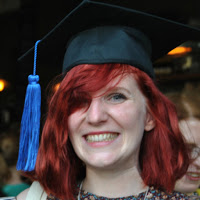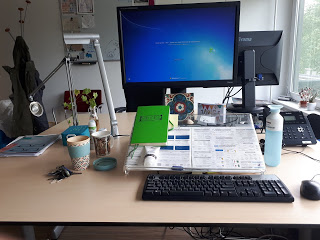I am Dominique Maciejewski, and This is How I Work
 Dominique Maciejewski did her bachelors in psychology in Wuppertal, Germany. In 2011, she came to the Netherlands for an internship at the Vrije Universiteit Amsterdam. It was supposed to be a 3-month internship, but Dominique really liked the Netherlands and so she stayed to write her thesis there. She graduated in 2014 from her research masters “Clinical and Developmental Psychopathology”, after which she started her PhD research. In 2016, she received her PhD Degree for her thesis about the development of mood variability during adolescence. In 2016, she went to the United States (Virginia Tech) for a postdoc on neurobiological determinants of adolescent psychopathology. After 6 months, she got offered a job as a postdoc and project coordinator for a large project – the Mood and Resilience in Offspring Project (MARIO; www.mario-project.nl). In 2017, Dominique and her colleagues received 1.4 million euros to set up the MARIO project, a project in children of parents with mood disorders to better understand, detect and prevent depression in those children. Dominique lives with her boyfriend in Amsterdam and enjoys yoga, playing guitar, meeting her friends, and drinking beers on her sunny balcony.
Dominique Maciejewski did her bachelors in psychology in Wuppertal, Germany. In 2011, she came to the Netherlands for an internship at the Vrije Universiteit Amsterdam. It was supposed to be a 3-month internship, but Dominique really liked the Netherlands and so she stayed to write her thesis there. She graduated in 2014 from her research masters “Clinical and Developmental Psychopathology”, after which she started her PhD research. In 2016, she received her PhD Degree for her thesis about the development of mood variability during adolescence. In 2016, she went to the United States (Virginia Tech) for a postdoc on neurobiological determinants of adolescent psychopathology. After 6 months, she got offered a job as a postdoc and project coordinator for a large project – the Mood and Resilience in Offspring Project (MARIO; www.mario-project.nl). In 2017, Dominique and her colleagues received 1.4 million euros to set up the MARIO project, a project in children of parents with mood disorders to better understand, detect and prevent depression in those children. Dominique lives with her boyfriend in Amsterdam and enjoys yoga, playing guitar, meeting her friends, and drinking beers on her sunny balcony.
General:
Current Job: Postdoctoral researcher and project coordinator at VUmc and Erasmus MC
Current Location: Amsterdam (VUmc) and Rotterdam (Erasmus MC)
Current mobile device: Samsung Galaxy A5
Current computer: HP at work, at home lenovo laptop
Can you briefly explain your current situation and research to us?
I am a postdoctoral researcher and project coordinator for a large project called MARIO – Mood and Resilience in Offspring (www.mario-project.nl). Children of parents with mood disorder have a higher chance to also develop a mood disorder, although there is a large percentage that stays resilient. This is a project in which we want to better understand, detect, and prevent depression in children of parents with mood disorders. As a project coordinator, I am doing everything that is needed to supervise the project, for instance our data management, fieldwork and two PhD students, who all do an amazing job. I have weekly meetings with them to discuss the progress, but also with other working groups and the principal investigators. In the past months, I have for instance prepared the application for the medical ethical committee, selected instruments, wrote a codebook, discussed contracts for an app that we want to use, and had a lot of meetings and e-mails. We are now planning to start data collection next month, which is super exciting.
What tools, apps and software are essential to your workflow?
R and Mplus (statistical software), ToDoist, Google Calendar, Outlook/Gmail, Mendeley, Dropbox/Drive (for sharing papers)
What does your workspace setup look like? 
Usually, it is full with papers. My most important thing is my little green notepad. I am still quite old fashioned. I need to take notes on paper. All my meetings and thoughts are in there. Of course I also type them in documents and save them later. I cleaned my desk a bit for the picture.
I work 2 days in Amsterdam and 2 days in Rotterdam. In Amsterdam I share a room with another postdoc and in Rotterdam I work at a flex place. I usually work from home 1 day. I have an own office room, where both my boyfriend and me can work from home if we want to (he is also a researcher). When I work from home, then this is my dedicated research day, because the other days I am so busy with coordinating the project, that I do not find a lot of time anymore for writing my own papers.
What is your best advice for productive academic work?
Use to do lists and make realistic goals for yourself. ALSO: Do not plan in anything 1-2 hours per day, because there is always something coming up you did not anticipate.
How do you keep an overview of projects and tasks?
I use ToDoist and Google Calendar, which really helps me, because all tasks I put into ToDoist, automatically appear in Google calendar and I can easily plan things. Moreover, it is also on my phone, so if I quickly think of something that needs to be done, I can just add it to my list. I can also assign it a specific project (but I do not do that anymore, because it costs me too much time).
Besides phone and computer, do you use other technological tools in work and daily life?
No
Which skill makes you stand out as an academic?
That I am truly enthusiastic about research and that I love to learn new things. And I can do that quite efficiently (must be my German roots).
What do you listen to when you work?
Usually nothing. If I do tasks that do not require a lot of thinking, I listen to music (currently I am into Hop Along and Florence and the Machine). Sometimes I also listen to audiobooks.
What are you currently reading? How do you find time for reading?
Currently I am reading Harry Potter (again). It is my favorite book as I read it for the first time when I was a kid. So it is a nice memory. I usually read before bed, but fall asleep after 5 minutes already.
Are you more of an introvert or extrovert? How does this influence your working habits?
Depends. I think more an extrovert. But I usually need some time to get used to people. Once, I do that, I never shut up and am very energetic and engaging.
I definitely became more extrovert since I am project coordinator. This is because I often have to call completely random people that I do not know. And if people do not meet their deadlines I have to remind them of them and sometimes I have to be pushy. SO, being extrovert helps.
What’s your sleep routine like?
I really try sleeping 7-8 hours every day. For me this is personally super important, because I have bipolar disorder and any drastic change in my sleeping pattern could be associated with an increased risk for mania.
What’s your work routine like?
Usually, I work between 8-10 hours. My contract is for 36 hours per week, but recently I found myself working in the evening and weekends. Now, I am practicing more self-care and try to leave office at 6.30 pm the latest and resist the temptation to continue working once I am home.
What’s the best advice you ever received?
It is totally fine if you make mistakes. Everybody does and you really will learn from then. If you once fail super hard, then you probably won’t make that mistake again.
Also, there is no shame in getting help if you need it! There are multiple resources available, so make sure to use them.
